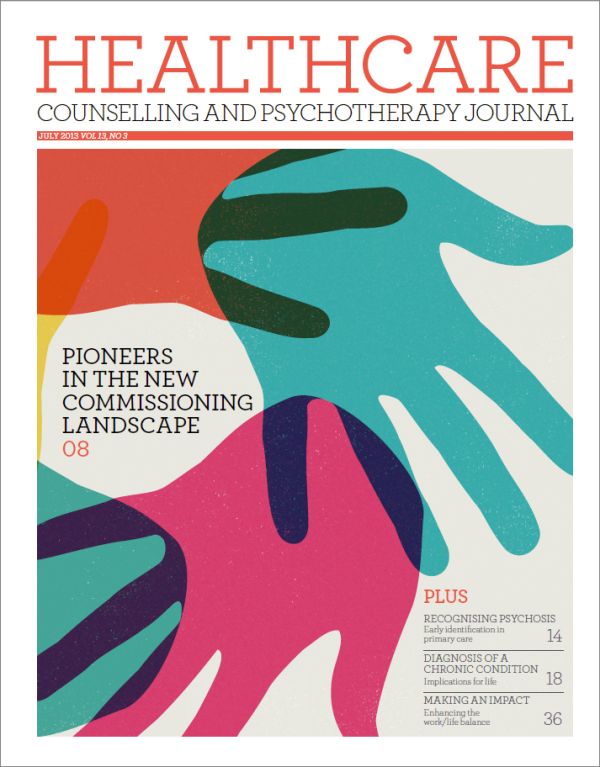In this issue
Features
Pioneers in the new commissioning landscape
The any qualified provider (AQP) scheme opens up the NHS marketplace to a wider range of psychological therapy providers. In a continuation of our series on commissioning in NHS England, we talk to early innovators Anne Drummond, Jane Hind and Vicki Palmer
Recognising psychosis
Early detection and treatment of this severe mental illness is vital to increase chances of recovery – and primary care practitioners could have a role to play, reports Lyndsey Holt
Diagnosis of a chronic condition: implications for life
Mike Kelly, a psychotherapist specialising in working with people diagnosed with kidney failure, presents an overview of some of the psychological issues a diagnosis can bring
No entry
Through a case vignette, Carol Martin-Sperry provides an insight into her work as a sex therapist
Perceptions of hospice bereavement counselling
A study by Bob Powell found room for more fully integrating bereavement support into hospice philosophy
Views of hypnotherapy
Following on from the article about combining hypnotherapy with CBT in the last issue, we feature two different approaches to using hypnotherapy in practice
Tackling depressed mood through exercise
Evidence shows us that physical activity can benefit mental health, says Andrew Peden
Making an impact
To reconnect with her values, person-centred therapist Michelle Oldale explored what it would take to become an aid worker
Regulars
Development – BACP Healthcare
Louise Robinson: Learning from the Francis Report
Counselling in primary care
Richard Mason: Send three and fourpence, we are going to a dance!
Third sector perspective
Michael Lilley: Coming off the fence
GP viewpoint
John Hague: Moving debate into the public realm
Resumé
Janet Garner

Not all articles from this issue are available online. Divisional members and subscribers can download the pdf from the Healthcare Counselling and Psychotherapy Journal archive.
From the editor
Changes in the way NHS psychological services are commissioned are likely to affect many of us in the months to come. From April this year, clinical commissioning groups (CCGs) replaced primary care trusts (PCTs) as the organisers of funding to the NHS; with their introduction came a range of possible commissioning models, one of which, Any Qualified Provider (AQP), aims to introduce competition into the marketplace and increase patient choice.
Changes can be unnerving: under AQP, which isn’t mandatory for commissioners but has already been introduced in some areas, existing psychological therapy providers may find themselves in competition with newly-contracted services to win NHS referrals. On the other hand, AQP has the potential to ensure a choice of counselling and psychotherapy services that are tailored to the needs of local communities. It could also mean that there will be a wider choice of therapy modalities available to clients and so more opportunity for services and/or individuals to provide them on the NHS.
Although the CCGs didn’t officially take control of NHS commissioning until April 2013, many did exist in shadow form before that, and AQP has been operational in some places since last year. In a continuation of our series of articles on commissioning, we talk to pioneers who have already gained AQP status, with the aim of helping others prepare for the process.
Keeping you updated on changes in healthcare is part of the work of this journal, but many of the features in this issue remind us that the work we do with clients continues despite the upheaval often going on around us. Mike Kelly’s article on working with clients diagnosed with a chronic condition focuses on some of the psychological processes a client can go through as they begin to find ways of enabling them to cope. Written with therapists working in primary care in mind but informative to all, Lyndsey Holt’s article on recognising psychosis aims to inform practitioners who could play a part in identification and instigating the assessment process to specialist services. Important because, as Lyndsey stresses, early detection and treatment of this severe mental illness is vital as chances of recovery are increased the sooner it is diagnosed.
Elsewhere, we have a range of articles covering a breadth of subjects, from hospice counselling and hypnotherapy, to sex therapy and using exercise to treat depression. And, to serve as inspiration, we feature a piece by person-centred therapist Michelle Oldale who, in an endeavour to reconnect with her values, make a positive impact, and engage in reflection, explored what it would take to become an aid worker. Michelle’s article brings us a welcome reminder of the ongoing requirement to look after ourselves in the work we do – never more important than at a time of change.
Sarah Hovington
Editor
hcpj.editorial@bacp.co.uk
